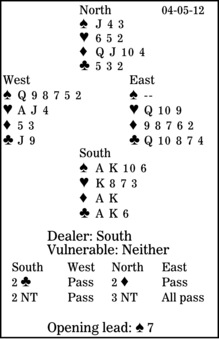Bridge column, April 5: The entry is there, if you think of it

At the bridge table, you might have no entry to one hand, no tricks from another, and, perhaps, no pounds, euros or dollars.
In this deal, South is in three no-trump. What should he do after West leads the spade seven?
With 24 high-card points all in aces and kings, and also having one 10, South made a slightly cautious two-no-trump rebid. However, it had the big advantage of leaving North room to use Stayman or a transfer bid to investigate a possible major-suit fit. If South had rebid three no-trump, North would have had to pass unless he had either a six-card or longer major, or sufficient points to be willing to reach four no-trump. Here, of course, it was a moot point, North not caring about the majors.
South seems to start with nine top tricks: three spades (given the lead), four diamonds and two clubs. However, to get four diamond tricks, declarer must first cash his ace and king, then cross to the dummy. And what is the dummy entry?
The only candidate is the spade jack. So South must resist the temptation to win the first trick with his 10; he must take the trick with his ace or king. Then, after unblocking his diamond honors, declarer leads a low spade toward dummy's jack.
West wins with his queen and shifts to a club, but South collects those nine tricks.
** ** **
COPYRIGHT: 2012, UNITED FEATURE SYNDICATE
DISTRIBUTED BY UNIVERSAL UCLICK FOR UFS

